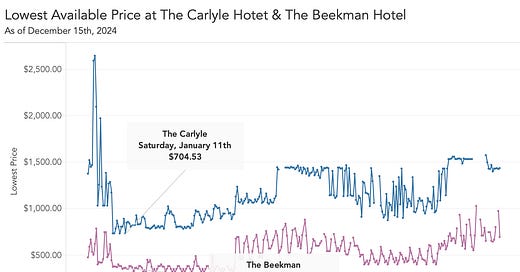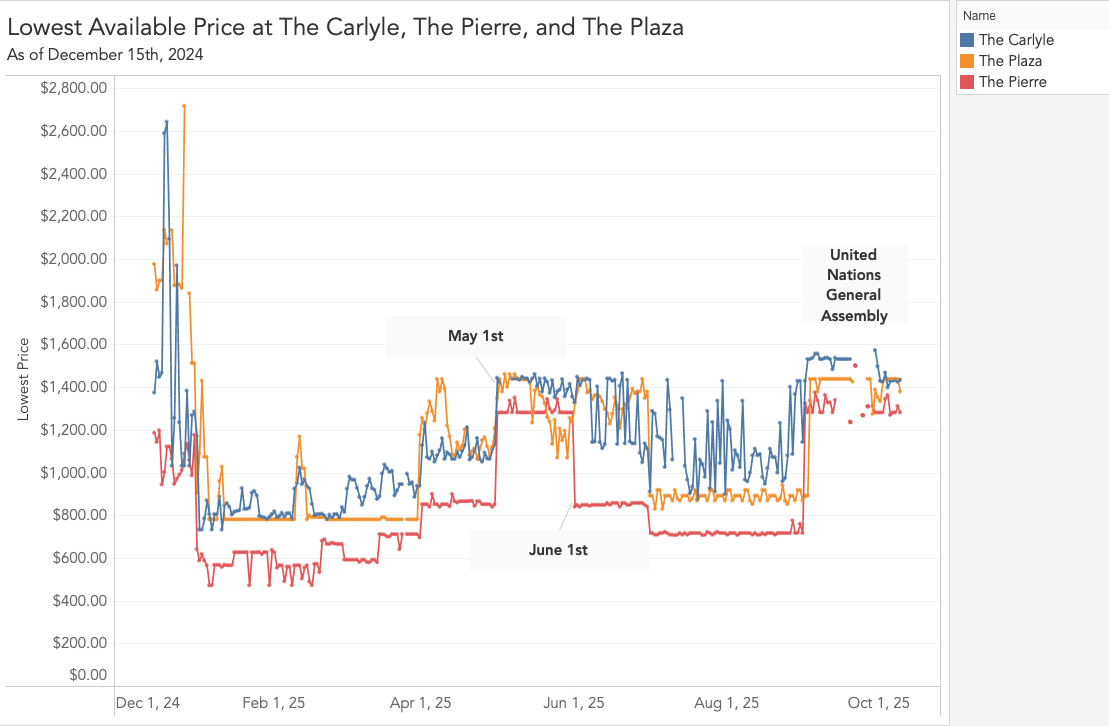I watched Always at the Carlyle over the weekend, a documentary about the storied Carlyle Hotel on the Upper East Side. It’s a very cozy holiday movie: you can doze off listening to stories about Princess Di visiting the hotel, or JFK’s liaisons with Marilyn Monroe, or Billy Joel sliding in to play piano at the famous Bemelmans bar.
Two main themes came up in interviews with the hotel’s staff: discretion and longevity.
Their dedication to their guests’ privacy fit my experience of being firmly asked to delete my photos at the Ritz bar— discretion is a big part of what guests are paying for at the nicest hotels.
Their staff also seemed to have incredible tenure and dedication to the hotel; lots of employees spend their entire careers there. There was clearly a shared mission that many of the employees felt to upholding the institution’s hundred-year tradition. That was cool to see and is missing in tech where most companies are less than 20 years old.
How the Carlyle prices and when you should go (theoretically)
I am sure it was a biased documentary, but it made the Carlyle seem like the best hotel in its category, and it made me want to go there and experience it. It’s very expensive — the median price over the next 10 months is $1,087. This reflexively seems ridiculous to me, and maybe it is.
But after writing this article about how there can be huge gaps in quality at the top of a distribution, I have decided it is often worth it to pay for the very best thing in a category, if you can. It seems like in many cases, the very best thing in a category is so much better than, say, the 75th percentile thing, that the best thing is actually still underpriced.
For example, let’s say you are planning a staycation for a relaxing Saturday night in the city in January. You could pay $352 per night at the Beekman Hotel downtown. The Beekman is a really nice hotel! I’ve stayed there — it has beautiful architecture, a lovely bar, the rooms are cozy and the service is good.
But, if what you care about is experiencing a really cool hotel, it seems likely to me that spending ~2x what you would spend at the Beekman for a night at the Carlyle would be totally worth it. They are playing a different game than the Beekman is — they monogram the pillows with each guest’s initials, the employees are incredibly dedicated and among the best in the world, and you might bump into a head of state in the elevator. It seems likely that the Carlyle experience would be something you’d remember for the rest of your life, and value more than twice as much as the Beekman experience, and so it would be well worth the eye-popping price tag.
I don’t think this is the case for all expensive things. But it may be the case for the best things, which often times can seem expensive. Or at least, that is the story I’m telling myself as I fantasize about staying there.
Unfortunately the Met Gala is pretty exclusive
In the documentary, Naomi Campbell recounts running around her floor at the Carlyle with Rihanna at a Met Gala after party. I was curious what the rate would be for data scientists who haven’t been invited to the gala; unfortunately, when I looked at prices and availability, it seems like rooms are unavailable May 3rd through 6th (the gala is May 5th next year):
Weekends are cheaper!
I was also curious about how hotels like this adjust price during the week. I assumed that weekends would be most expensive (because I assumed there’d be higher demand from people vacationing) but I found the reverse was true — Tuesday and Wednesday nights were the most expensive, and weekends were cheaper, with Sunday night the least expensive.
I guess in general, business travelers who are even considering a hotel this nice probably have a very high willingness to pay? The only exception in the data I looked at was at Aman New York, which is astonishingly expensive, especially on Friday and Saturday. Even with lots of motivated reasoning I don’t think I could ever talk myself into paying for a night at the Aman.
UN delegates ball out on hotels
In the documentary, people compared the Carlyle to the Pierre and the Plaza, both of which are fancy old money-style hotels up near the east side of Central Park. It was interesting to see how correlated their pricing is, with each of the hotels substantially increasing prices in May and then June, before lowering them at the end of the summer.
I was curious about the sharp price raise and unavailability at the end of September, and as far as I can tell it is because of the UN General Assembly — apparently countries will book out entire floors at at these hotels for their delegates. Imagine drinking scotch at Bemelmans with Tayyip Erdoğan and Eric Adams! An experience worth paying for.
Anyway, if you’re looking for a last minute holiday gift and have some money to burn, book a night at the Carlyle, ask the elevator operators to tell you stories, sleep on a monogrammed pillow and let me know how it is.
Thanks for reading! If you enjoyed this, you might like this post analyzing hotel differentiation or this one about how there are often completely different levels of quality in a distribution.
You might also check out the book Hotel Splendide, which is about the Ritz but is by Ludwig Bemelmans, namesake of the bar at the Carlyle.









Very persuasive. Start a gofundme 😃.
Agree with Jim Nicholas.
Benn Stancil did a nice blog on how there are huge differences between top marathoners and amazing athletes we might meet in an ordinary lifetime. The top is much much better than the 95th percentile. But I don’t think it follows that something that is 5X more expensive that it will necessarily deliver 5X or 10 X more utility or enjoyment. It may only deliver a little bit more enjoyment. For example, there are some wines that are very expensive and rare, and they do taste better than the typical stuff. But there are also wines that are very expensive and rare yet they don’t really taste much different (to me) than much cheaper ones. I do believe there are people who are willing to pay the premium and who believe they are getting a bargain for the additional enjoyment they perceive. But the effect is not universal. I won’t necessarily enjoy something just because other people are able to justify a huge price for it.